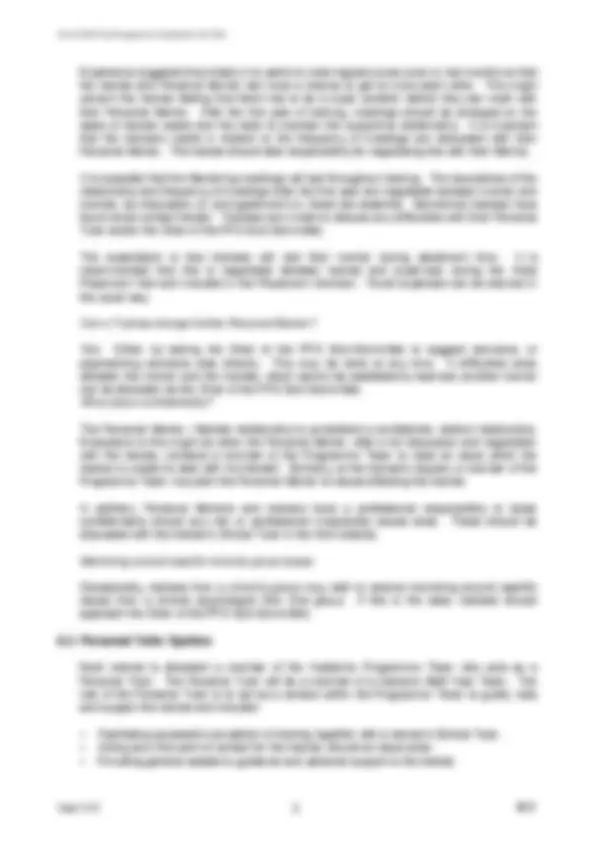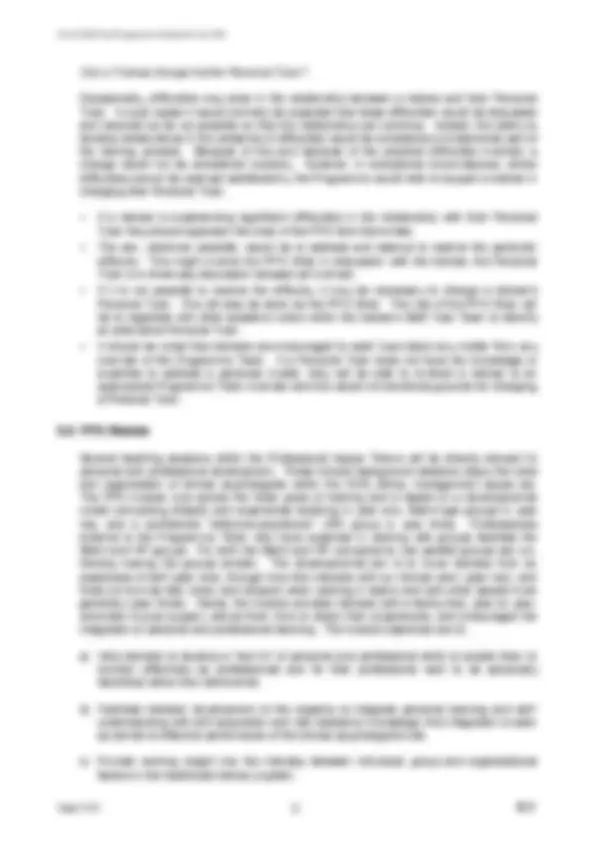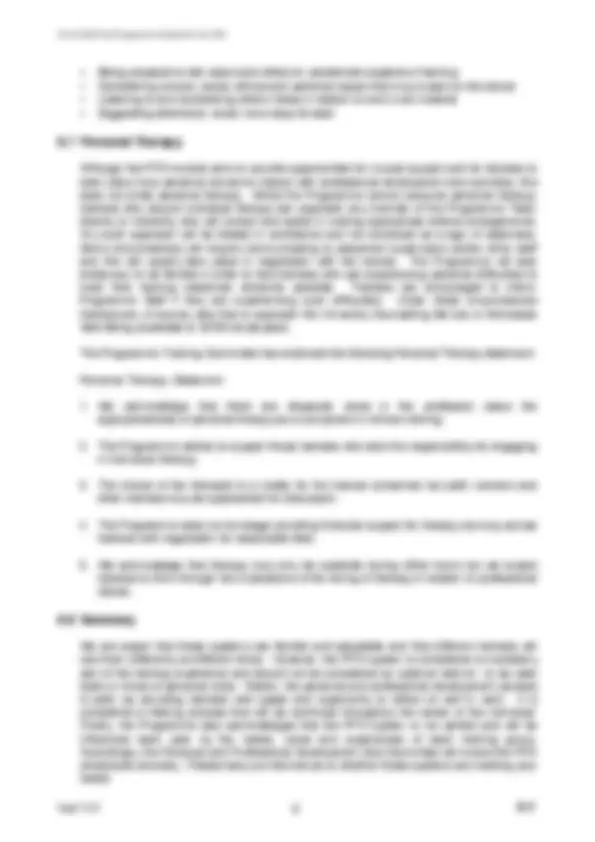







Study with the several resources on Docsity

Earn points by helping other students or get them with a premium plan


Prepare for your exams
Study with the several resources on Docsity

Earn points to download
Earn points by helping other students or get them with a premium plan
Community
Ask the community for help and clear up your study doubts
Discover the best universities in your country according to Docsity users
Free resources
Download our free guides on studying techniques, anxiety management strategies, and thesis advice from Docsity tutors
This information provides an overview of the Programmeʼs policy regarding personal support and professional development as discussed and agreed by the ...
Typology: Study notes
1 / 9

This page cannot be seen from the preview
Don't miss anything!






This information provides an overview of the Programmeʼs policy regarding personal support and professional development as discussed and agreed by the Programme Training Committee. This information is available to trainees, Programme staff and supervisors. Implementation of the components of the policy is monitored and evaluated by the Personal and Professional Development (PPD) Sub-Committee. We wish to emphasise that there are opportunities for trainees to strongly influence the discussion and implementation of policy changes and this can be achieved through representation on the PPD Sub-Committee. The Programme is committed to enabling the personal and professional development of trainees throughout the three years, and regards this area of training as an essential foundation for future professional development and practice. The Programme staff recognise that throughout the three years of the Programme, trainees face a variety of challenges that are an ordinary consequence of professional training as a clinical psychologist and that these issues are relevant to both trainee and qualified psychologists. The Sheffield Programme aims to meet some of these needs via the PPD module, which is overseen by the PPD Sub-Committee. Membership of the Sub-Committee comprises an academic programme team member, a clinical tutor representative and trainee year representatives. People teaching on the module and other programme team members are welcome to attend. To be effective, aspects of the PPD training require confidentiality for trainees so that individual concerns can be freely expressed without fear of adversely affecting the trainee's standing with the Programme. On the other hand, it may also be necessary for the Programme Team to be made aware of specific issues arising for trainees out of the training process and to have the opportunity to influence the contents and conduct of the module. This balance between confidentiality and communication is an integral part of the PPD process and the PPD Sub-Committee is a useful forum to discuss the way safe and appropriate information is exchanged between the PPD parts of the Programme and the Programme Team.
At the centre of PPD module lie three interconnected aims: the importance of learning about self; learning about self in systems and groups; and learning the professional requirements of working as a clinical psychologist. With the first aim, it is considered that the role of the clinical psychologist involves actively working alongside people and systems in distress. Learning about such processes will undoubtedly affect the personhood of the trainee as they develop strategies and skills to manage these processes. Personal development in the role of the clinical psychologist is therefore considered an essential focus of training. The second aim, which underpins PPD, is to provide trainees with an opportunity to learn about different types of relationships and people in systems and our responses to them. These aims are supported through the following:
The Programme staff hope that by adopting a positive and open attitude to personal support, trainees will feel able to approach any member of the Programme Team or their supervisor for advice on both professional and personal issues. It is up to the trainee to negotiate and
establish how confidential or open these discussions can be. For new trainees, either prior to or at the very start of their training, a "buddy" system of existing Sheffield trainees is available and organised by the trainees themselves.
The Programme recognises the need for both trainee and qualified psychologists to have opportunities to discuss personal and professional issues, which arise from clinical practice in a confidential and non-evaluative setting. Accordingly, the Personal Mentor scheme has been designed to provide trainees with the opportunity to meet regularly to discuss such issues with an individual who is outside of the formal framework of the Programme but who as a qualified clinical psychologist is aware of, and sympathetic to, the needs of trainees. The content of these discussions is to be negotiated but might include: professional development, placement experiences, personal issues, academic progress, and difficulties with the Programme etc. It should be emphasised that Personal Mentors are an additional source of support for trainees, and should not replace the usual relationships or functions offered by supervisors, Clinical Tutors and other members of the Programme Team. Meeting with a Personal Mentor is a mandatory part of the training process. The following notes are intended to answer questions about the scheme, both for trainees and Personal Mentors. Aims of the Personal Mentor Scheme The aim of the scheme is to provide trainees with the opportunity to meet regularly with a qualified clinical psychologist throughout training to discuss their personal and professional development, in a confidential and non-evaluative setting. It is meant to be a source of personal support, which is available throughout training rather than a crisis support system for trainees experiencing difficulties. However, it is hoped that trainees who are encountering such difficulties will feel able to approach their Personal Mentor for additional support. It should be stressed, however, that Personal Mentors are not available as personal therapists, but might act as an advocate for the trainee to ensure an appropriate referral via the Programme, if such action is required. Who are Personal Mentors? Personal Mentors are qualified clinical psychologists who have expressed an interest and willingness to act in this capacity. Eligibility to occupy the role of mentor includes both a commitment towards supporting trainees through the training process and that the mentor has at least a year's experience of working within the NHS. New trainees are allocated a Personal Mentor by the Chair of the Personal and Professional Development Sub-Committee and/or a Clinical Tutor. The process by which mentors are linked up with trainees is done on the basis of a number of factors, e.g. practical considerations such as minimising travelling time. Who manages the process? Once Personal Mentors have been allocated, the Chair of the PPD Sub-Committee will inform both parties. The trainee should then take the initiative in contacting their mentor and arranging the initial meeting. It is recommended that, particularly during the first year of training, trainee and mentor should meet at least twice a term. It is the traineeʼs responsibility to arrange meetings and keep in touch with their mentor. We suggest you make first contact within 2 weeks of receiving their details.
Can a Trainee change his/her Personal Tutor? Occasionally, difficulties may arise in the relationship between a trainee and their Personal Tutor. In such cases it would normally be expected that these difficulties would be discussed and resolved as far as possible so that the relationship can continue. Indeed, the ability to develop relationships in the presence of difficulties would be considered a fundamental part of the training process. Because of this and because of the practical difficulties involved, a change would not be considered routinely. However, in exceptional circumstances, where difficulties cannot be resolved satisfactorily, the Programme would wish to support a trainee in changing their Personal Tutor.
Several teaching sessions within the Professional Issues Theme will be directly relevant to personal and professional development. These include background sessions about the roles and organisation of clinical psychologists within the NHS, ethics, management issues etc. The PPD module runs across the three years of training and is based on a developmental model comprising didactic and experiential teaching in year one, Balint-type groups in year two, and a confidential "reflective-practitioner" (RP) group in year three. Professionals external to the Programme Team who have expertise in working with groups facilitate the Balint and RP groups. For both the Balint and RP components, two parallel groups are run, thereby making the groups smaller. The developmental aim is to move trainees from an awareness of self (year one), through how this interacts with our clinical work (year two), and finally to how we feel, react, and respond when working in teams and with other people more generally (year three). Hence, the module provides trainees with a facility that, year on year, promotes mutual support, allows them time to share their experiences, and encourages the integration of personal and professional learning. The module objectives are to: a) Help trainees to develop a "tool kit" of personal and professional skills to enable them to function effectively as professionals and for their professional work to be personally beneficial rather than detrimental. b) Facilitate traineesʼ development of the capacity to integrate personal learning and self- understanding with skill acquisition and with academic knowledge; this integration is seen as central to effective performance of the clinical psychologist's role. c) Provide working insight into the interplay between individual, group and organisational factors in the healthcare delivery system.
facilitator, the group reflects upon what they have heard with the aim of deepening understanding of factors impacting on the work task. By the end of the programme each group member will have had experience of, and opportunity to reflect upon, being in the multiple roles of witness, participant and observer. The Reflective Practitioner (RP) Groups (Year 3) The group provides an opportunity for trainees to meet regularly with their peers to reflect on their experiences in professional practice. The facilitatorʼs role is to help the group members to create a relatively safe space in which people can be open about their emotional, intellectual and behavioural responses to their work as clinical psychology trainees. This can include work with clients, responses to the Training Programme and Programme staff, experiences of supervision and NHS contexts and to each other as peers in the training process. Groups also offer an opportunity for trainees to learn together about the emotional experience of training, and of working alongside others with different perspectives. It is the intention that the group should provide an opportunity for trainees to express their uncertainties and reveal their vulnerabilities during the training process. It is to this end that the facilitator plays no other major role in training and confidentiality is maintained within the group, except where personal safety might otherwise be compromised. Despite these intentions, participants may experience the full range of emotions and sometimes feel uncomfortable. The tasks of the group are personal and less likely to provide distractions from these emotions that might be afforded by more neutral topics. The aims of the RP groups are:
Although the PPD module aims to provide opportunities for mutual support and for trainees to learn about how personal concerns interact with professional development and activities, this does not entail personal therapy. Whilst the Programme cannot resource personal therapy, trainees who require individual therapy can approach any member of the Programme Team directly or indirectly who will consult and assist in making appropriate referral arrangements. Any such approach will be treated in confidence and not construed as a sign of weakness. Some circumstances will require communicating to placement supervisors and/or other staff and this will usually take place in negotiation with the trainee. The Programme will also endeavour to be flexible in order to help trainees who are experiencing personal difficulties to meet their training objectives wherever possible. Trainees are encouraged to inform Programme Staff if they are experiencing such difficulties. Under these circumstances trainees are, of course, also free to approach the University Counselling Service or Workplace Well-Being (available to SHSC employees). The Programme Training Committee has endorsed the following Personal Therapy statement: Personal Therapy: Statement
We are aware that these systems are flexible and adaptable and that different trainees will use them differently at different times. However, the PPD system is considered a mandatory part of the training experience and should not be considered an optional 'add-on', to be used solely in times of personal crisis. Rather, the personal and professional development process is seen as providing trainees with space and opportunity to reflect on self in work. It is considered a lifelong process that will be continued throughout the career of the individual. Finally, the Programme also acknowledges that the PPD system is not perfect and will be influenced each year by the needs, views and experiences of each training group. Accordingly, the Personal and Professional Development Sub-Committee will review the PPD procedures annually. Please keep us informed as to whether these systems are meeting your needs.